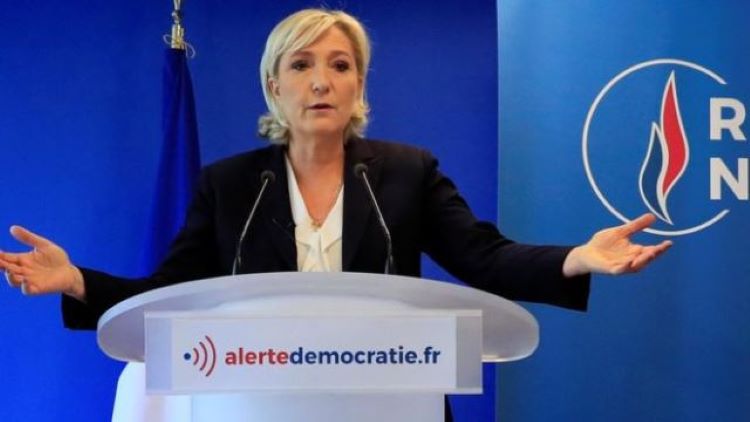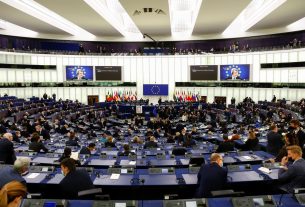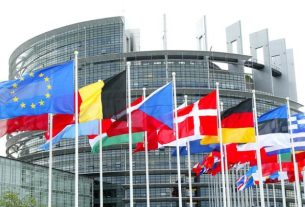France’s far-right National Rally (RN) party has made huge gains to win the first round of the country’s snap parliamentary elections, according to exit polls, as political dealmaking began among rival parties to keep the RN from power and protesters gathered in major cities.
Pollsters IFOP, Ipsos, OpinionWay and Elabe projected Marine Le Pen’s RN to win about 34 percent of the votes, the left-wing New Popular Front (NFP) coalition about 29 percent, and President Emmanuel Macron’s centrist Ensemble Alliance in third spot with about 20.3 percent.
Macron stunned the country by calling the snap election after the RN surged in European Parliament elections last month, gambling that the anti-immigration party with historical links to anti-Semitism would not repeat that success at the national level.
At party leader Marine Le Pen’s Henin-Beaumont constituency in northern France, supporters waved French flags and sang the Marseillaise.
“The French have shown their willingness to turn the page on a contemptuous and corrosive power,” she told the cheering crowd.
RN President Jordan Bardella, Le Pen’s protege and candidate for prime minister, pointed out that the second round would be “the most important in the history of the French Fifth Republic”.
He said that Macron’s party has been wiped out and accused the far left of creating an “existential crisis” representing “a real danger to France and all the French people”.
Pollster Elabe said in an estimate for BFM TV that the RN and its allies could win 260-310 parliament seats in the second voting round on July 7, while Ipsos projected a range of 230-280 seats for RN and its allies in a poll for France Television.
Le Pen and Bardella have both said their party is chasing an absolute majority – a total of 289 seats – in the National Assembly, France’s lower house of parliament.
Macron calls for ‘broad democratic alliance’
The RN’s chances of winning power and forming a government depend on political dealmaking by its rivals over the coming days. In the past, centre-right and centre-left parties have worked together to keep the far right from power.
Macron called for a “broad” democratic alliance against the far right.
“Faced with National Rally, the time has come for a broad, clearly democratic and republican alliance for the second round,” he said in a statement.
He added that the high turnout in the first round spoke of “the importance of this vote for all our compatriots and the desire to clarify the political situation”.
Prime Minister Gabriel Attal warned that the far right was at “the gates of power”, and that “no vote should go to the National Rally”.
Jean-Luc Melenchon, who leads the left-wing New Popular Front, said he would withdraw candidates who placed third in the first round of parliamentary elections, to ensure two-horse races to defeat the highest number of far-right RN candidates in the coming vote.
If no candidate reaches 50 percent in the first round, the top two contenders automatically qualify for the second round, as well as all those with 12.5 percent of registered voters. In the run-off, whoever wins the most votes takes the constituency.
“In line with our principles and our stances in all previous elections, we will never allow the National Rally to achieve victory,” said Melenchon.
Laurent Berger, the former secretary-general of the French Democratic Confederation of Labour and current European Trade Union Confederation chairman, urged for a “blockade” in a post on X.
“This evening, our democracy and our republican values are at stake in the face of the National Rally on the threshold of power,” Berger said.
“In the face of danger… It is imperative to block the extreme right”.
High turnout
On Sunday, Ipsos estimated the turnout at 8pm (18:00 GMT) when polls closed, was 65.5 percent, which would be the highest since 1997.
The RN was for years a political pariah in France, but Le Pen has sought to rebrand the party since taking control from her father Jean-Marie Le Pen and has now brought it closer to power than it has ever been.
According to Rim-Sarah Alouane, an academic at University Toulouse-Capitole, Le Pen “has done plastic surgery to her party”.
“But is it still the same rotten, xenophobic, anti-Semitic, anti-Muslim, anti-minorities party… we know what the far right is standing for,” Alouane told Al Jazeera.
She said the results of this vote were also a rejection of Macron’s policies, with the president seen as “haughty” and pandering to the wealthy.
“I know personally about cases of people who voted for the far right because of the policies made by Macron, especially at an economic level,” Alouane said.
The results sparked protests on the streets of Paris, Lyon, Nantes and other major cities.
A few thousand anti-RN protesters gathered at a rally of the leftist alliance on Sunday night in Paris’s Place de la Republique.
Najiya Khaldi, a 33-year-old teacher, said she felt “disgust, sadness and fear” at the RN’s strong results.
“I am not used to demonstrating,” she said. “I think I came to reassure myself, to not feel alone.”
If the RN does manage to secure an absolute majority in the second round, it would create a tense period of “cohabitation” – whenever the president is from a different political party than the majority of MPs – with Macron, who has pledged to serve out his term until 2027.
An alternative outcome could see protracted negotiations to form a sustainable government.
Risk analysis firm Eurasia Group said the RN now looked “likely” to fall short of an absolute majority. France was facing “at least 12 months with a rancorously blocked National Assembly and – at best – a technocratic government of ‘national unity’ with limited capacity to govern”, it added.__Courtesy Al Jazeera News





